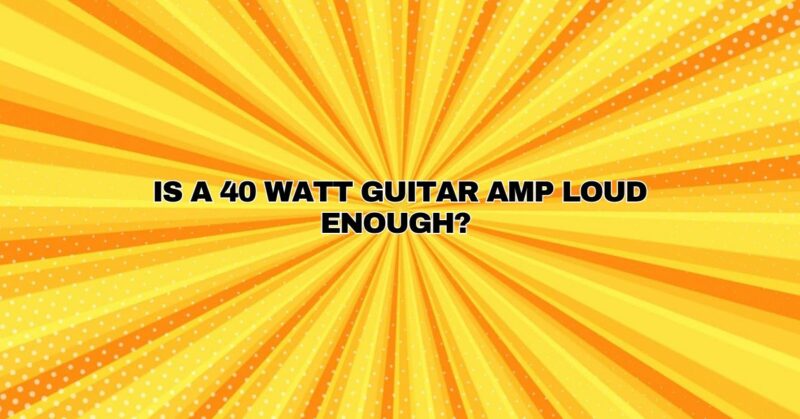The world of guitar amplification is diverse, offering a wide range of options to suit the needs of every guitarist. One crucial consideration when choosing an amplifier is its wattage. The wattage of an amplifier determines not only its volume but also its overall tonal characteristics and suitability for different playing environments. In this article, we’ll explore the question: Is a 40-watt guitar amp loud enough, and what factors should you consider when selecting the right amplification power for your needs?
Understanding Amplifier Wattage
Before diving into the specifics of whether a 40-watt guitar amp is loud enough, let’s first understand what amplifier wattage means and how it impacts your sound.
Amplifier wattage refers to the power output of the amplifier, which determines how loudly it can project sound. In general, the relationship between wattage and volume is not linear. Doubling the wattage does not double the volume. Instead, it takes about ten times the wattage to double the perceived volume. This means that a 40-watt amp is significantly louder than a 4-watt amp, but not necessarily four times as loud.
However, wattage is not the only factor influencing volume. Speaker efficiency, cabinet design, and the type of amplifier (tube, solid-state, modeling) all play a role in determining the final volume and tonal characteristics of the amp.
Factors to Consider
- Playing Environment: The first consideration when choosing amplifier wattage is your playing environment. If you primarily play in a bedroom or a small practice space, a 40-watt amp may be overkill. Conversely, if you’re a gigging musician performing in larger venues or with a loud band, a 40-watt amp can be a suitable choice.
- Tonal Goals: Wattage also affects the way your amp distorts at higher volumes. Lower-wattage amps tend to break up (distort) earlier, providing a natural overdrive sound at lower volumes. If you want to achieve power amp distortion without deafening volumes, a lower-wattage amp might be preferred.
- Speaker Configuration: The number and size of speakers in your amplifier’s cabinet can significantly impact volume and projection. A 40-watt amp with a single 12-inch speaker will sound different and potentially less loud than a 40-watt amp with a 4×12 cabinet, for example.
- Amplifier Type: The type of amplifier also plays a role in volume and tonal characteristics. Tube amps tend to be perceived as louder than solid-state amps of the same wattage due to their harmonic richness and natural compression. Modeling amps offer various volume options and can be suitable for both practice and performance.
When is a 40-Watt Amp Loud Enough?
A 40-watt guitar amp can be loud enough for a variety of situations, including:
- Live Performances: In small to medium-sized venues, a 40-watt amp can provide sufficient volume to be heard clearly in a band context. However, for larger venues or outdoor gigs, you might need to mic your amp or consider higher wattage options.
- Rehearsals: A 40-watt amp is generally more than enough for band rehearsals, as long as your drummer doesn’t play excessively loudly. It should cut through the mix without any issues.
- Recording: In a studio setting, 40 watts can be suitable for capturing a wide range of tones, especially if you need your amp to provide natural tube overdrive.
- Practice: A 40-watt amp can be used for practice, but it might be louder than necessary for bedroom or late-night playing. In such cases, it’s essential to have a master volume control or an attenuator to lower the amp’s output while maintaining tone.
Conclusion
Whether a 40-watt guitar amp is loud enough for you depends on your specific needs and playing situations. It offers a versatile balance between power and manageable volume levels. However, it’s crucial to consider factors like your playing environment, tonal preferences, and speaker configuration when choosing the right amp wattage for your requirements. Ultimately, the best amp for you is one that not only provides the desired volume but also complements your playing style and musical goals.


